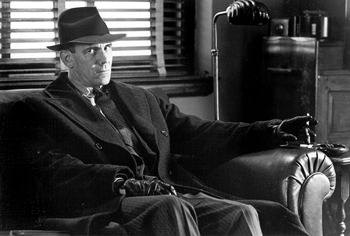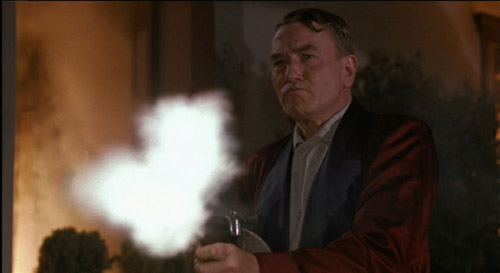Oh, how fun typing is when you’re sniffling every other word. Bah.
In a way, I felt like Miller’s Crossing was somewhere in between The Glass Key and Yojimbo. It didn’t hold as true to Ned’s personality in the book as Sanjuro in Yojimbo, but it wasn’t quite as far away as “Ed” in The Glass Key. Certain plot points were more identifiable as parallels to those in the book, while others were obviously constructed for the film alone. Miller’s Crossing has the same themes and character personalities as the book, but the actual events are altered slightly, and lines are invented. Granted, these invented plot twists and lines are occasionally brilliant. For example, Tom and Leo’s exchange: “You and I have faced worse odds.” “Never without reason. It helps to have one.” Also, Leo’s single-handed annihilation of the hit men iss spectacular.
These things were added for the same reason things were added in the old version of The Glass Key: audience appeal. However, the Coen brothers accomplish this much more successfully–not to mention with more style–than Heisler.
The most obvious deviation from the book–for me, at least–is the dramatic alteration of the relationship between the protagonist and femme fatale. Verna just seems too obvious, too unrefined. While Leo and Tom are fairly accurate versions of their literary counterparts, Verna’s personality and actions stray too far from Janet’s. However, the same end is accomplished (Leo’s break with Tom), so this is a fairly small complaint. Her involvement with Tom slightly changes the audience’s perception of him. In the novel, Ned has his faults, but is generally being kicked around by fate (or Jeff). In Miller’s Crossing, he’s not quite the martyr he is in The Glass Key. Tom has a fairly casual sexual relationship with Verna–despite his friendship with Leo. This betrayal of friendship changes his character subtly, making him just a little more responsible for resulting events. The audience tends more towards fascination and curiosity, rather than sympathy. This was an excellent film-making choice, because it forces the audience to focus more on the intricacies of the plots and characters by limiting emotional responses to Tom. This detachment is something that is not present (at least to the same degree) in The Glass Key or Yojimbo.
As far as the other characters go, Shad and Jeff’s personalities seem to be, in a way, reversed. Johnny Caspar is almost affectionate with Tom, and has the same reckless, violent impulses as Jeff, whereas Eddie Dane has Shad O’Rory’s intensity and astuteness.

The introduction of Bernie’s character lends a third element that, while missing in the book, works surprisingly well in the film, and further justifies Tom’s mistrust of everyone.


